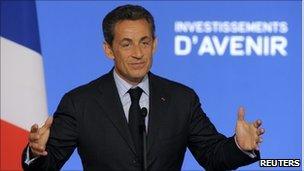Greece: French banks ready to roll over loans, Sarkozy
- Published

French President Nicolas Sarkozy says his country's banks would help Greece by giving it 30 years to repay.
France's Figaro newspaper said banks are ready to relend - or roll over - 70% of loans they hold.
The plan is being worked out by the French government and bankers.
Greece, which has not yet exhausted all its first 110bn-euro (£98bn, $158bn) bail-out, is already standing by for further rescue loans expected to be up to 120bn euros.
Losses
However, the German government and others have been pressing for banks and other private-sector lenders to Greece to be involved this time round.
German banks are reported to be very interested in the French model being discussed.
A group of international bankers are currently meeting eurozone officials in Rome to discuss the crisis.
The matter is fraught because credit rating agencies, who determine the credit-worthiness of borrowers, have already said they will view any roll-over of loans by banks as a technical default, something that is tantamount to bankruptcy.
The head of the eurozone's rescue fund, Klaus Regling, is talking to the ratings agencies to explore ways to avoid a default rating.
European policymakers - notably the European Central Bank - are also concerned that the move could force Europan banks to recognise billions of euros in losses on Greek debts they currently hold, and could also trigger payouts on credit derivative contracts.
'Restart the system'
Meanwhile, in earlier comments, Axel Weber, the former president of Germany's central bank, said the piecemeal approach to Greece's debt problems would not work.
Mr Weber said EU governments should accept that at some point they would need to "restart the system".
The ex-Bundesbank chief said the current options for Greece were either a default with debt writedowns, or for Europe to guarantee all Greece's debts.
He said that repeatedly offering aid would only work for a limited time.
In an interview with the Wall Street Journal, Mr Weber - who was once seen as a likely candidate to run the European Central Bank - said: "There are, unfortunately, only very limited options: Either a default or partial haircuts or a guarantee for the outstanding amount of Greek debt."
He added that "the current piecemeal approach of repeated aid programmes inevitably leads to the latter solution. At some point you've got to cut your losses and restart the system."
Opposition
This week is another crucial one for the indebted country.
The Greek parliament will discuss a new range of austerity measures, which include introducing income tax on earnings of 8,000 euros (£7,142, $11,600).
The ruling party has 155 seats in a 300-seat parliament and polls suggest the proposals are opposed by three quarters of Greece's 11 million population.
On Monday evening Greek Prime Minister George Papandreou urged parliament to vote through the austerity measures in a "unique opportunity to keep the country on its feet".
With the Athens government on the verge of bankruptcy, and a 48-hour general strike about to start, Mr Papandreou said the new budgetary plan would give Greece "a fresh start towards a productive economy".
The austerity measures must be agreed before Greece can get its hands on the latest slice of the 110bn euro support package.
The country cannot stay financially afloat without that.
Contamination
Meanwhile, two major investors have warned of the gravity of the situation facing Europe.
The joint head of the world's biggest bond fund manager, Pimco, has said Greece's sovereign debt restructuring is inevitable.
And leading investor George Soros, who reportedly made £1bn when the pound crashed out of the euro's forerunner, the ERM, said the world was on the brink of another disaster.
"Let's face it: we are on the verge of an economic collapse which starts, let's say, in Greece but could easily spread," he said.
Mr Soros said it was almost inevitable that one or more eurozone country would exit the single currency.
Britain's "big four" banks - Lloyds , Barclays, Royal Bank of Scotland and HSBC - have a relatively small exposure to Greece.
They have a larger exposure to other struggling eurozone economies, particularly Ireland and Spain.
France's banks hold around 15bn euros in Greek government debt.